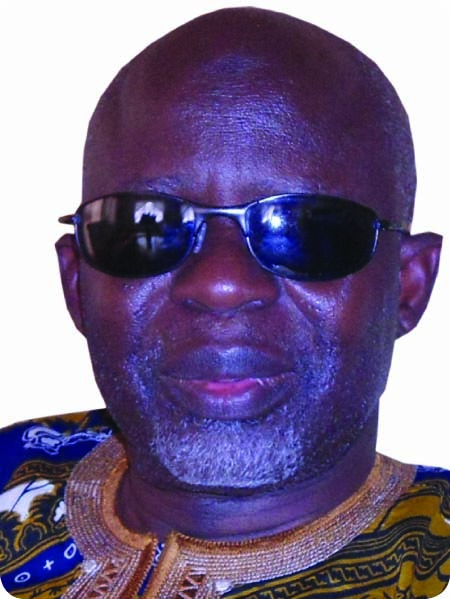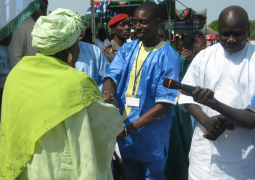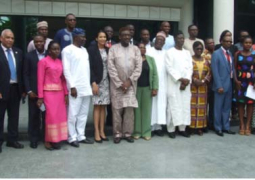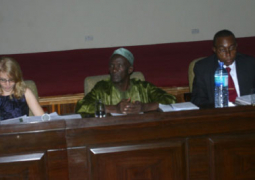
Darboe said the constitutional review committee did a very good job in putting that clause in the country’s supreme law.
It is supposed to be a tour that is a political; it has to be a non-political tour. “Unfortunately, it has been somehow misused, and made a campaign tour, with the yai compins, youth mobilisers; “the sort of gathering you find at mass rallies,” he added.
Speaking in an exclusive interview with The Point, centered on some of the burning issues of the day, the leader of Gambia’s largest opposition party, the United Democratic Party (UDP) also stated that public servants whose departments have dealings with the rural population – health, education, agriculture, and so forth, are given a back-seat role.
“One would have expected that on such occasions, the technical officers would be addressing the issues there, but you do not find that.”
It is not un-common, Darboe went on, for President Jammeh for every tour to pick a theme, and use that as his campaign tool. He recalled that there was the “back-to-the-land” call in one of his past tours.
He added that one cannot divorce from the policy of “back-to-the-land”, the new call for food security and food self-sufficiency.
“If the government had meaningfully pursued that policy of back-to-the-land, we would now not be talking of a 2016 target for food self-sufficiency in The Gambia. We would have by now been self sufficient in food; not only in rice, but other cereals, all the necessary food items we need.”
“But”, continued the opposition leader, “these are mere propaganda tools, just as he has done with talk of a railway project – what has become of it. We have heard him talk about the Alhamdulilahi project for the oil business - what about that – that is now a forgotten story; we’ve heard him talk about the Silicon Valley project - another forgotten project.”
Darboe said Jammeh is adept at diverting people’s attention, and that his cronies help him in achieving that. “They coin a theme that looks very attractive; very sensible, but unachievable.”
“I cannot imagine how by 2016 you can prepare the land, in any part of the country, to such an extent that you cultivate the required hectareage to produce rice sufficient to feed the nation, and then export the surplus. It’s just not possible!”
Darboe recalled that in 2008, Jammeh said The Gambia should be self-sufficient in five years, “and nothing has happened”.
“My view is that Gambia certainly is capable of growing food enough to feed the population. I had zonalized, in my own thinking, the country into zones. Central River Region is certainly quite suitable for rice cultivation, and all we need to do is to create the conducive environment for foreign investors in commercial farming”.
About the announced plan to set up a food security corporation, Darboe advised against “standing on a platform and playing to the gallery; saying this is what you are going to do.”
“It has to be seriously thought out. You just don’t get up and say we are going to establish a food security corporation, just from the blue. Your technical experts have to advise you.
“If that happens, then what is going to be the role of the department of Agriculture, of NARI, all those institutions. These are things that you think about; have them thoroughly discussed at the drawing board, when you discuss the policy issues, and then come out with the fine product.
“You just don’t go to Fatoto, see a crowd of people wearing your ashobi, and clapping for you, and you say this is what you are going to do, without really discussing it.”
Ousainou Darboe said the government must look at the pros and cons of such a corporation, and how it would impact on other departments that are involved in agricultural activities.
He said there was an agri-business agency established for achieving self-sufficiency in food, but it was not workable, simply because the policies were not given the adequate consideration that they deserved. “They were just matters that impulsively came out,” he said.
Darboe said he was not surprised that Jammeh said so, and that he will, come next year, say something different.
Jammeh is fond of blaming his technicians, and accusing them of not doing the work required, as was the case with some projects in CRR, when people in the department of Agriculture were blamed for the failure, “at the time when he was, in fact, the minister in charge of Agriculture.”
“But then, because of his ability to shift blame on people, he did put the blame on the technicians, on the technocrats, who had no means of responding to his allegations,” Darboe added.
“I would love to see The Gambia really self-sufficiency in food.”
However, he continued, “with all these farms that are being cultivated for him; when you use the sweat and toil of the ordinary people from Panchang, Mabali, Garawol, Kartong, Som, Kafuta and some people coming from across the border; tilling his farms in all parts of the region, in all parts of the country.
“If this was properly harnessed, and the resources made available to the ordinary farmers, then we would have started moving towards a target for food self sufficiency.”
The opposition leader continued: “Because we have to equip the farmers, so that they can produce enough to feed themselves; but if they go to the land, till the land for you, produce for you, and then you want those people to be self sufficient in food, you are not achieving anything; you are just using their labour to promote your so-called back-to-the-land, which is in my view back-to-Yahya Jammeh’s-land; and not back-to-the-farmers’ land.”
“Let me commend one thing. I’ve said this once or twice in the past. The former minister for Youth, Mr. Gomez, when he embarked on these youth farms, I thought that was a commendable policy, and thought that should be replicated throughout the country.
“Equip the people, at the grassroots level to have their own farms, their own community farms, and not to have farms cultivated for Yahya Jammeh in Kaur, when the alkalo of Kaur is there as the supervisor and the chief of Janjanbureh is there, in Tumani Fatty, doing things for the President.”
Darboe hoped the minister of Agriculture would encourage the sort of thing that former minister Gomez did with regards to youth farms.




